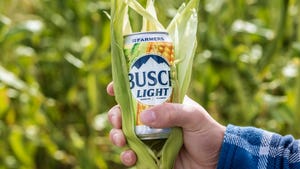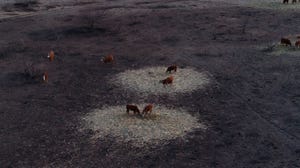What's driving cattle sales
The big operators aren’t really the movers and shakers in many local sales.
April 22, 2022

The weeks seem to fly by. I know I am not the only one that feels this way. Last week I mentioned the price gouging taking place with distiller's grains. A local feed yard manager sat beside me at an auction this week and told me the ethanol plant near him begged him last fall to contract some distillers, so they knew they had a place to get rid of it. He agreed to do it and has taken a little over half of what he contracted so far.
This week the plant pulled the plug on their contract. They can sell it to someone else for a lot more money. This is the third time in recent memory ethanol plants have refused to honor their contracts. When we talk to local farmers, they are not hauling in corn they are selling for almost eight bucks, they are hauling in corn they contracted back when it was five to six. So this week I am offering grain marketing advice, do not honor your contracts because today you can sell it to the ethanol plants for a lot more money. What is good for the goose is good for the gander.
The power of small beef producers
For most of my lifetime the smart people have said you have to get big or get out. Some think the days of the small family farm are limited and going to run out soon. I do not understand why these industry “experts” hate small so much. Most of the calves produced in this country come from small producers. If these experts are going to hate on small producers, they are pretty much hating on the bulk of the cow/calf segment. That makes no sense to me since they are the source of cattle.
I have brought up the topic of how our operations benefit others before. I am going to illustrate that point today, specifically how small operations benefit others.
I was at a female sale this week. Some of the cattle there came from the bigger local reputation herds, and some came from very small herds. The size of consignments ranged from four to fifty head. The auction had a difficult time trying to sell groups that were bigger than five head. When they offered to gate cut the bidding process became much more active. The prices paid for some of these pairs and bred stock amazed me. I guess these small guys have feed and are not concerned about the increasing drought conditions here. The point is there were many of these small volume buyers and they made the market.
The auctioneer offered gate cut on the bigger reputation consignors' cattle too. There was one problem, he floored the cattle to high. If he had been willing to sell them for $150/head less I bet he would’ve sold them all. Instead he got to pay the high freight bills to get them to the auction and back home again. Those cattle weren’t worth that much to anyone but him. Given the distance he lives from the auction barn he would have been better off to sell them for a little less. In this case the bigger operation helped no one but the truck stop he bought fuel from.
I saw the same thing this week at another feeder auction. Some people showed up and were in a hurry to get back home so they could continue farming. They only needed two to three dozen head of turn out ready stockers. They bought what they needed right away at the beginning of the sale and paid what they needed to pay to get the deal done. After these guys left the market dropped 12-20 dollars.
There is another perfect example how the small guys made the market, if only for a short while. It’s also a good example of mismanaging the inventory triangle. They were more concerned about how long it was going to take before they could get back to the field. Their willingness to overpay for cattle for the sake of time cost them $3,000 more than it should have. If they were really concerned with money and time they should have just used an order buyer, and stayed in the field.
The small operations helped the market by selling their small packages of cattle this week. The small operations helped the market by buying the cattle this week. When we look at it this way small is a pretty awesome thing.
Market reports and reality
I like market reports because they give us an idea of what is possible. Some folks think these reports give them a feel for the market. Nothing could be further from the truth. I looked at the market reports from the sales I attended, and it doesn’t tell the story at all. The only way you’re going to get a feel for the market and really understand what is going on is to be there. This entire blog would not exist today the way it is written if I had not been at auctions this week. I would not have had a clue the small operations made the market, or that it was all based on small groupings of cattle. The information on the market reports is somewhat misleading
Farming rules everything around me. The over-valuation for pairs that fit the calving window for corn planting was huge. $600 over “late” calvers is huge to me. The people selling the “late” calvers were wearing seed corn swag, and seemed willing to take the discount because “you have to be done calving before planting begins”. They also were the ones buying the over-valued pairs. The corn planting date determines if a female is over or under-valued.
View from the markets
Here is what I noticed in the female markets. All females were selling above their intrinsic value, except the late spring calving mature cows, and broken mouth pairs. The younger the female the more she brought over her intrinsic value. First and second calvers were greatly over-valued at the auctions I attended.
I mentioned the trend of fitting the corn planting window. Females that fit that window saw a depreciation scale of $160 per year of age. The late calvers were half that.
The feeder markets were much the same again this week. The Value of Gain was positive on cattle weighing up to 600-pounds. At that point there is an obvious cliff.
The big news is the big price bump in fats this week. This changed the relationship between fats and feeders in a big way, making much more of the feeder spectrum under-valued to fats.
The opinions of Doug Ferguson are not necessarily those of beefmagazine.com or Farm Progress
About the Author(s)
You May Also Like



.png?width=300&auto=webp&quality=80&disable=upscale)

